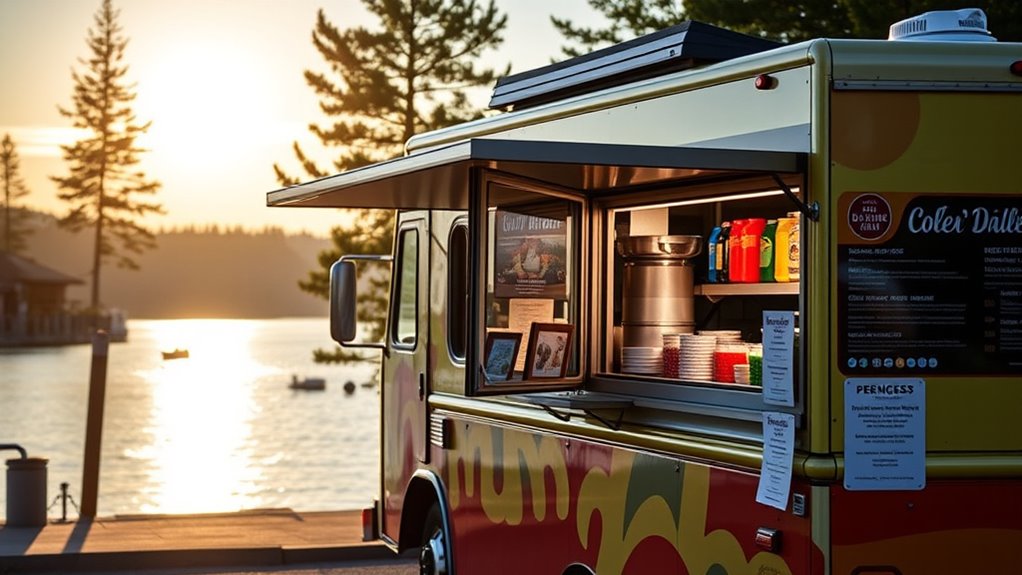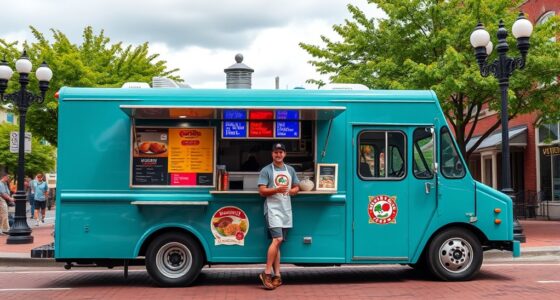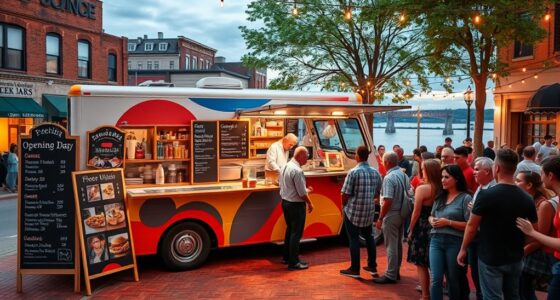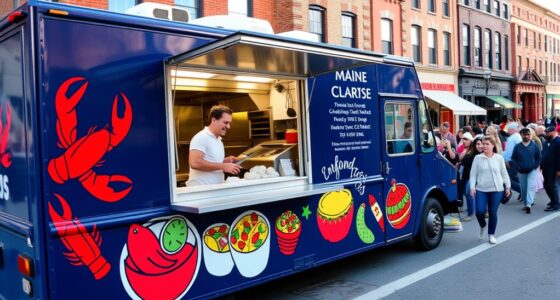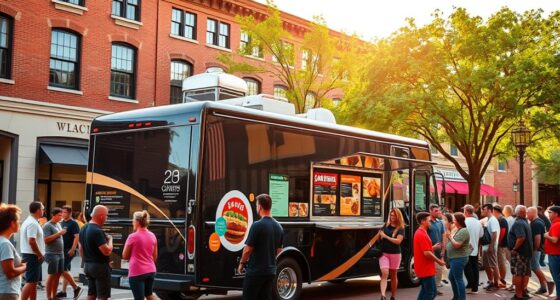To open a food truck in Coeur D’Alene, you’ll need permits like a Class D concession permit, a seller’s permit, and a Mobile Food Establishment License. Expect costs between $600 and over $28,000, including fees for licenses, insurance, and equipment. Find prime spots at events or markets, but avoid school zones during sessions. Develop a simple menu, focus on health and safety, and use social media to attract customers. Keep these tips in mind as you move forward.
Key Takeaways
- Obtain necessary permits including a Class D permit, food establishment license, and health department approvals, with application submissions at least 30 days prior.
- Budget for initial costs ranging from $15,000 to over $150,000, covering vehicle, permits, insurance, inventory, and marketing expenses.
- Choose high-traffic event locations and secure private property or licensed food court approvals, avoiding school zones and adhering to safety distances.
- Develop a simple, appealing menu using seasonal ingredients, with a focus on quick service, clear design, and hygiene compliance.
- Promote your truck via social media, engaging customers with visuals, updates, and promotions while maintaining compliance with local regulations.
Understanding the Permitting Process and Licensing Requirements
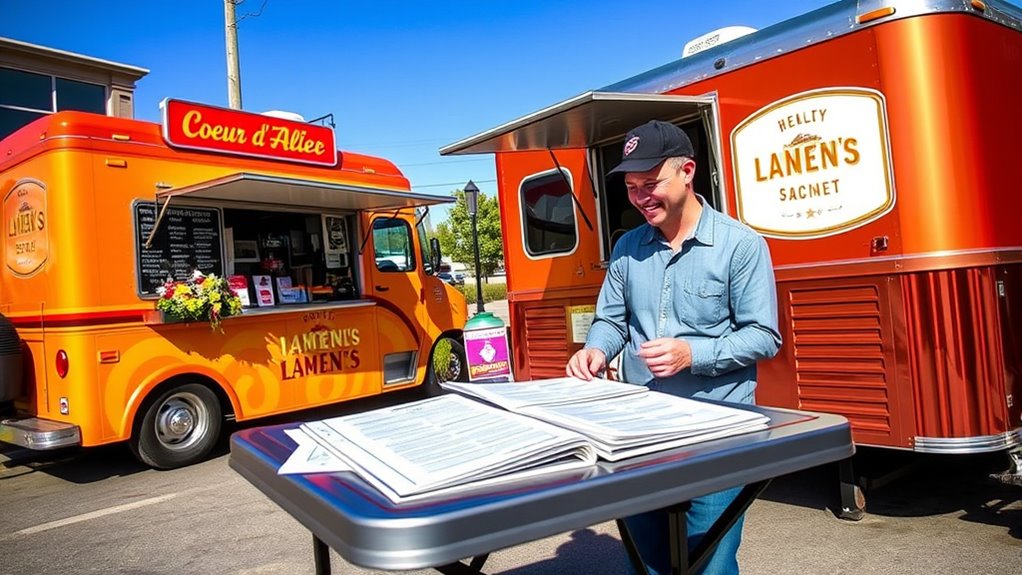
To operate a food truck in Coeur d’Alene, you need to navigate a clear permitting and licensing process. First, you must obtain a Class D permit for mobile concessions on public property and a valid Idaho seller’s permit** to sell food or drinks legally. You’ll need to submit a Mobile Food Establishment License Application, including a floor plan and menu. If you use a commissary kitchen, a Commissary Agreement signed by both parties is required. Pay a $100 plan review fee and a license fee between $80 and $100. Applications are due at least 30 days before opening. You’ll also need to schedule a safety inspection with the Fire Department and carry an approved fire extinguisher. Proper licensing guarantees compliance before you start serving customers. Additionally, understanding the divorce process in your state** can be helpful if legal matters arise during your business setup.
Estimating Costs and Fees for Your Mobile Food Venture
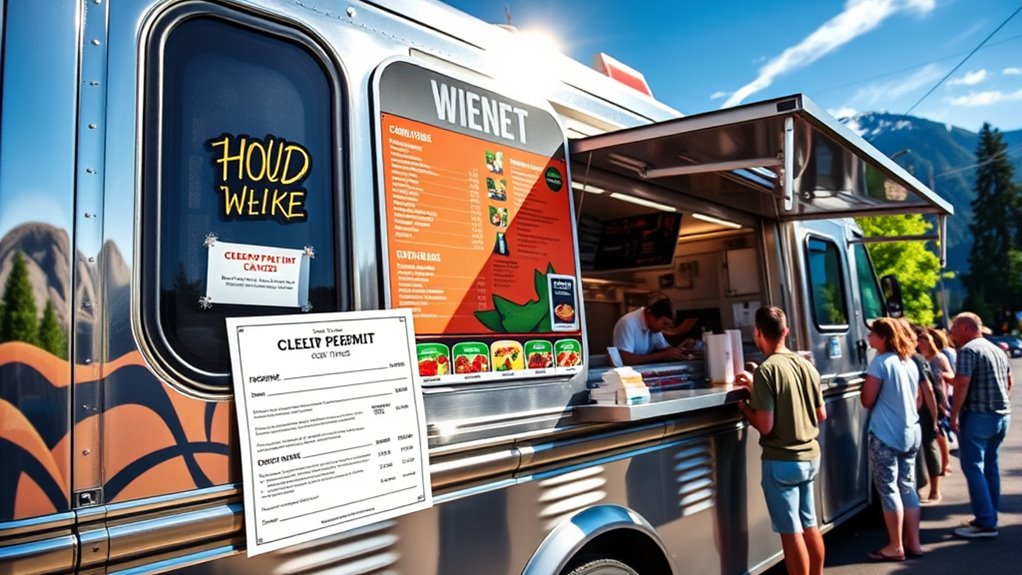
Estimating the costs and fees for your mobile food venture helps you create a realistic budget and plan for success. Your initial investment can range from $15,000 for a used coffee truck to over $150,000 for a new, fully equipped model. Building out or customizing the truck adds additional costs, especially for commercial-grade equipment. Licensing, permits, and insurance vary widely, with fees from under $600 to over $28,000. Operational costs like ingredients, fuel, and maintenance also add up monthly. Marketing expenses, including branding and advertising, typically account for 12–20% of gross revenue. Here’s a quick overview:
| Cost Category | Range | Notes |
|---|---|---|
| Truck Purchase | $15,000 – $150,000 | Used vs. new, equipment included |
| Licensing & Permits | <$600 – over $28,000 | Varies by city and state |
| Initial Inventory | $2,000 – $3,000 | Ingredients, packaging |
| Equipment & Supplies | $500 – $1,000 | Fuel, maintenance |
| Marketing & Branding | 12–20% of gross revenue | Advertising, logo design |
Additionally, understanding permitting requirements in Coeur D’Alene can help you avoid costly delays.
Navigating Location Restrictions and Site Selection
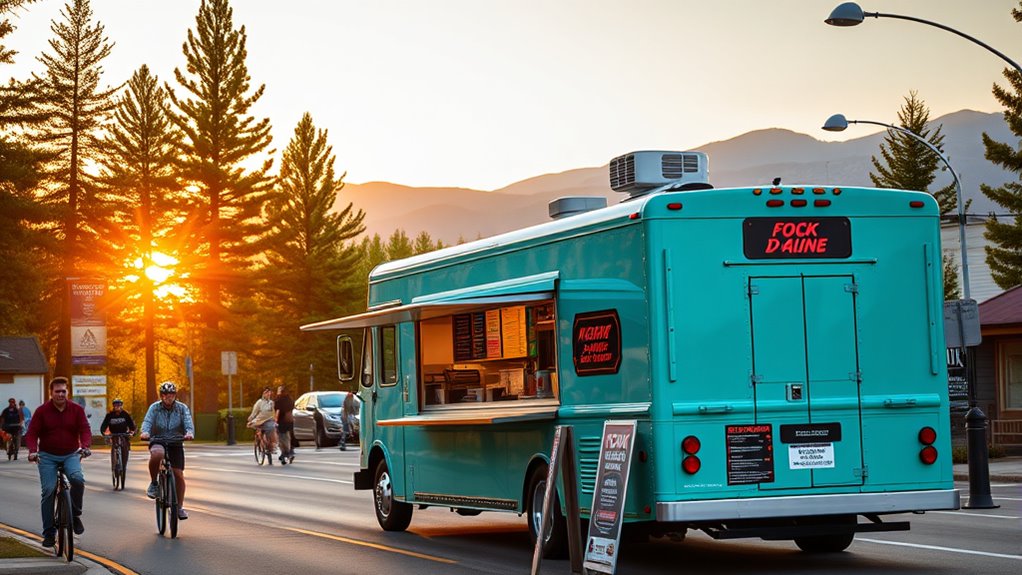
Managing location restrictions and choosing the right site are crucial steps for mobile food vendors to guarantee compliance and maximize business opportunities. First, you must avoid operating within 1,200 feet of any school during school sessions to prevent violations. Second, make sure you’re on approved private or public parcels with written permission from owners or licensed food courts. Third, select locations with proper spacing—such as maintaining a 20-foot clearance for fire safety and propane tanks positioned at least 10 feet from property lines unless approved. Keep in mind, your permit must be visibly displayed, and you’ll need approval from the fire department and health district. Moving along city streets is permitted if you have the right permits, but static parking without authorization could lead to penalties. Additionally, permits are nontransferable, so ensure your site complies with the original permit conditions to avoid revocation. It’s also important to stay informed about local regulations and any updates that could affect your operating rights.
Developing a Menu and Operational Strategies
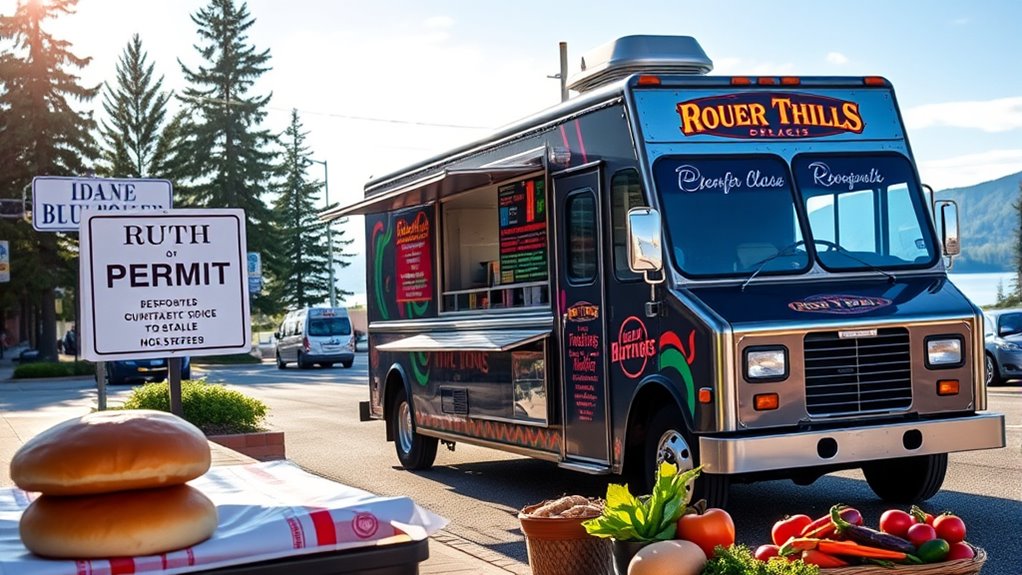
Creating a menu that’s simple, focused, and quick to prepare helps you serve customers efficiently and maintain quality. Incorporate seasonal and local ingredients to keep your offerings fresh and relevant while supporting the community. A well-crafted menu can also boost profitability by highlighting high-margin items and offering appealing combo deals. By designing your menu thoughtfully and planning operational strategies, you’ll maximize sales and streamline your daily workflow.
Menu Design Strategies
Designing an effective menu for your food truck involves strategic choices that attract customers and streamline operations. To do this, consider these key strategies:
- Use color psychology: employ warm colors like red and orange to stimulate appetite and highlight limited-time or high-profit items. Incorporate green for fresh, healthy options, and maintain neutral backgrounds for readability. Color psychology significantly influences customer choices, increasing sales by guiding their attention to specific items.
- Optimize font selection: choose sans-serif fonts like Arial or Helvetica for clear digital and print readability. Make headings bold and large, with body text at least 36 points for quick scanning.
- Strategic placement: follow the “Golden Triangle Rule” by positioning top-selling and high-margin items in the top right corner and top third of the menu. Limit highlighted items to 3-5 to reduce decision fatigue.
These strategies help create a visually appealing, easy-to-navigate menu that encourages sales.
Operational Planning Essentials
Effective operational planning starts with developing a streamlined menu and efficient strategies that support your food truck’s daily functions. Analyze each step—from food prep to service and cleanup—to identify bottlenecks and implement processes that boost speed while reducing waste. Invest in energy-efficient, space-saving equipment tailored for a mobile kitchen, and design your truck layout for smooth flow during peak hours. Use staffing software to forecast demand, schedule the right team members, and cross-train staff to increase flexibility. Monitor labor costs closely to balance profitability with service quality. Incorporate workflow optimization techniques to further streamline operations and improve overall efficiency. Integrate technology like mobile POS systems, automated inventory management, and online ordering to streamline transactions and reduce wait times. Regular maintenance and customer feedback ensure consistent food quality and operational efficiency.
Ensuring Health, Safety, and Regulatory Compliance
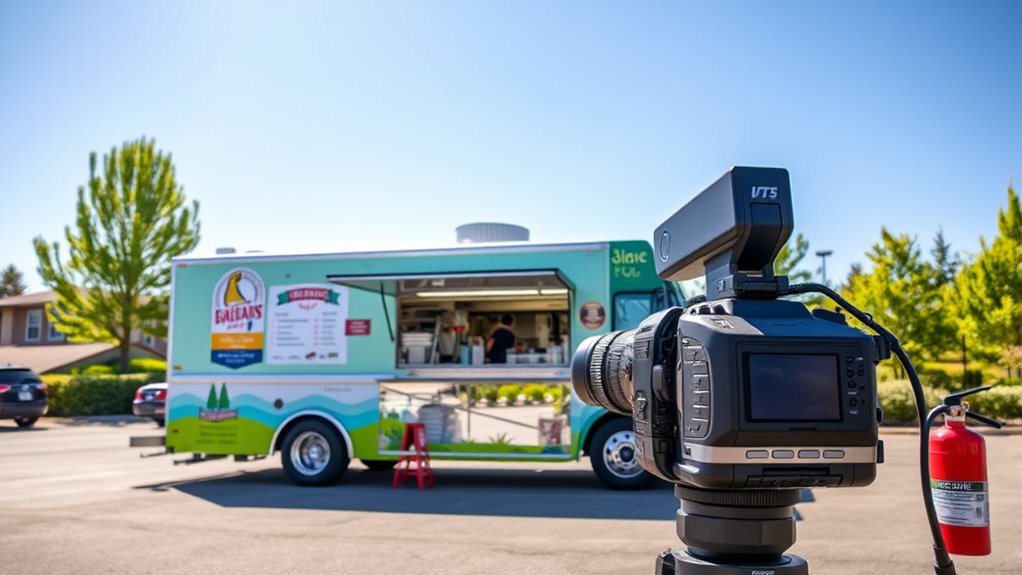
Ensuring health, safety, and regulatory compliance is essential for mobile food vendors operating in Coeur d’Alene. To stay compliant, you must:
- Obtain a health and sanitation license from the Central District Health Department, submitting floor plans, menus, and operational plans at least 30 days before opening. Regular inspections guarantee compliance. Proper documentation helps streamline approval processes.
- Follow food safety regulations by handling, storing, and controlling temperatures of hazardous foods, and maintaining cleanliness within 10 feet of your unit.
- Meet fire and safety standards, including passing safety inspections, carrying a fire extinguisher, and adhering to city codes on operating hours and location restrictions.
- Coordinate with city officials to ensure your food truck’s location and operation hours meet local zoning and permit requirements.
Staying on top of these requirements helps you avoid fines, ensures customer safety, and keeps your operation running smoothly.
Effective Marketing and Business Growth Tips
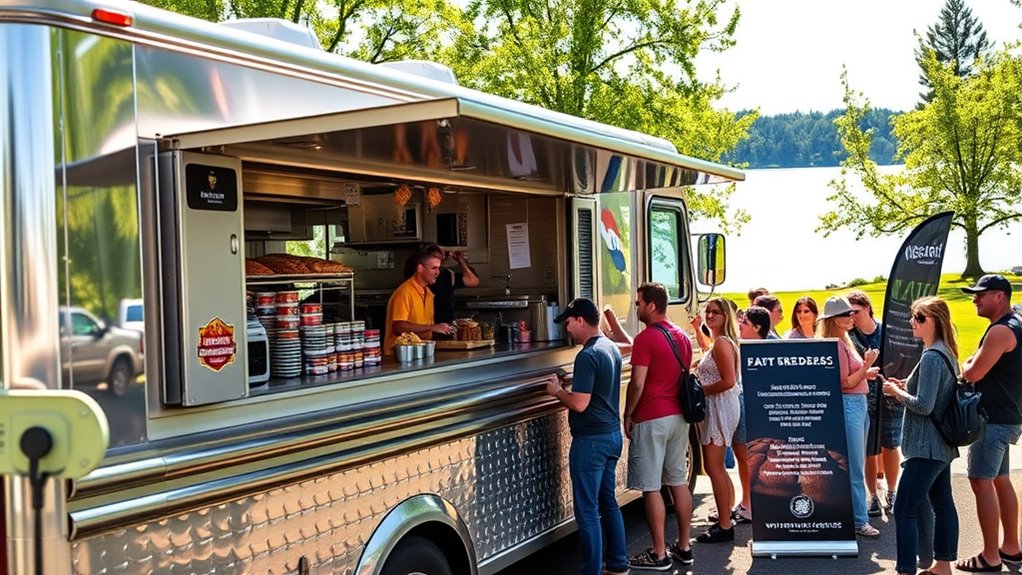
To grow your food truck business in Coeur D’Alene, you need to master effective marketing strategies. Using social media platforms like Facebook and engaging with local events can boost visibility and attract new customers. Combining digital efforts with community involvement creates a powerful recipe for sustained growth. Customer engagement and loyalty programs such as loyalty apps and seasonal promotions can further increase repeat visits and customer retention. Additionally, leveraging Email Marketing with targeted campaigns can enhance customer relationships and drive repeat business.
Utilize Local Events Strategically
Leveraging local events is one of the most strategic ways to boost your food truck’s visibility and sales in Coeur d’Alene. By selecting the right events, you can reach diverse audiences and maximize your impact. Consider these three key steps:
- Choose high-traffic events like the Taste of Coeur d’Alene or the North Idaho State Fair, where large crowds increase your sales potential.
- Tailor your menu to match event themes and attendee preferences, offering quick, family-friendly, or patriotic specials.
- Partner with other vendors and follow all setup, health, and safety guidelines to secure prime spots and foster community connections. Establishing a strong presence at local festivals can significantly enhance your brand recognition and customer base.
Food trucks and carts are thriving in Coeur d’Alene, making local events an ideal opportunity to gain exposure and attract new customers. Staying active at seasonal markets and community celebrations helps maintain consistent visibility and builds local loyalty.
Leverage Digital and Social Media
Wondering how to maximize your food truck’s visibility and attract more customers in Coeur d’Alene? Focus on selecting the right social media platforms where your target audience is most active. Use Instagram for eye-catching food photos and behind-the-scenes content, Facebook for promotions and events, Twitter for real-time updates, and YouTube for engaging videos. Post high-quality images and videos regularly to stay top-of-mind, sharing behind-the-scenes stories and encouraging customer-generated content. Respond promptly to comments and messages to build relationships. Keep followers informed about your location, menu specials, and events through real-time updates and geotags. Launch targeted ads on Facebook and Instagram, run contests, and track performance to optimize your marketing efforts—boosting visibility and sales in Coeur d’Alene. Consistent engagement across these platforms ensures your audience remains interested and connected to your brand. Additionally, leveraging online reputation management can help build trust and attract new customers.
Tips for a Successful Food Truck Launch in Coeur D’Alene
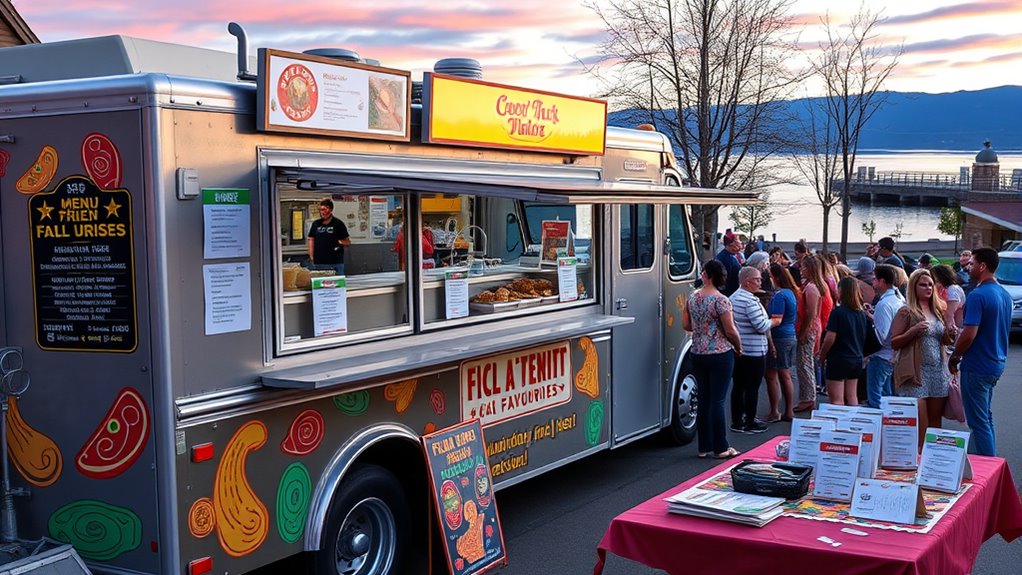
Launching a successful food truck in Coeur d’Alene requires careful planning and adherence to local regulations. First, verify you obtain all necessary permits, including an Idaho seller’s permit and a Mobile Food Establishment License, submitted at least 30 days before launching. Second, choose your operating locations wisely: target popular events like Taste of Coeur d’Alene, follow city rules about operating hours, and avoid school zones during sessions. Third, develop a menu that’s quick, portable, and appealing—using a commissary kitchen when needed—and keep your truck and surrounding area clean to meet health standards. By following these steps, you’ll set a solid foundation for your food truck’s success and build a loyal customer base in Coeur d’Alene. Additionally, understanding the permitting process can help streamline your approval and ensure full compliance with local laws.
Frequently Asked Questions
How Long Does the Entire Food Truck Permit Approval Process Typically Take?
The entire permit approval process usually takes around 30 days once you submit a complete application. You’ll need to allow extra time if there’s remodeling or plan amendments, or if coordination with agencies like health, fire, and city officials takes longer. To avoid delays, make sure your application is thorough and submitted early. Be prepared for possible additional review time depending on your specific situation and project complexity.
Are There Specific Zoning Laws That Restrict Food Truck Operation Hours?
You might think hours are flexible, but in Coeur d’Alene, zoning laws hold the key. They restrict your operation hours and locations, especially near schools and residential areas. If you ignore these rules, you risk permits being revoked. Zoning codes dictate where and when your truck can operate, ensuring you stay compliant. So, before you hit the road, make sure you understand these critical restrictions—your business depends on it.
Can I Operate My Food Truck at Multiple Locations Simultaneously?
You can’t operate your food truck at multiple locations simultaneously. Local regulations require you to work only at approved sites from sunrise to sunset, and operating in multiple spots at once isn’t explicitly permitted. Plus, each location may need separate permits, inspections, and compliance with safety and sanitation rules. Managing multiple sites would be complex, costly, and likely violate city code, so you should focus on one approved location at a time.
What Are Common Reasons for Permit Application Rejections in Coeur D’Alene?
Did you know nearly 40% of permit rejections stem from incomplete or inaccurate applications? You might face rejection if you don’t submit all required criminal history checks, fingerprints, or fees, or if your business isn’t compliant with city codes. Common issues include operating without proper permits, failing fire safety inspections, or violating zoning rules such as proximity to schools. guarantee your documentation and plans meet all regulations to avoid delays or denial.
How Often Do Health and Safety Inspections Occur After Licensing?
You’ll face health and safety inspections regularly after licensing in Coeur d’Alene. Typically, health inspections happen once a year, with fire safety checks also annually. Sometimes, inspectors might visit unexpectedly to ensure ongoing compliance. You need to keep your truck up to code, address any violations immediately, and stay prepared for both scheduled and surprise inspections. Consistent compliance helps you avoid fines, warnings, or shutdowns, keeping your food truck legally operational.
Conclusion
Launching your food truck in Coeur d’Alene is like planting a seed in fertile ground—you’ll nurture it with passion, navigate the winds of permits and costs, and watch it bloom with your unique flavor. With the right location, a tempting menu, and savvy marketing, your venture can grow into a vibrant beacon on the city’s culinary landscape. Keep your vision steady, and watch your food truck journey flourish like a wildflower in full bloom.
